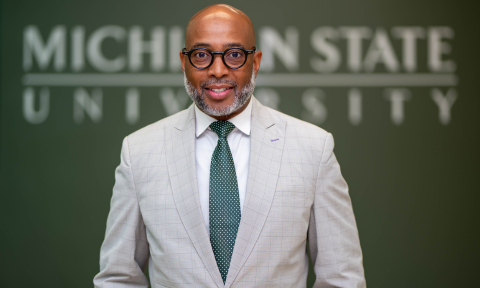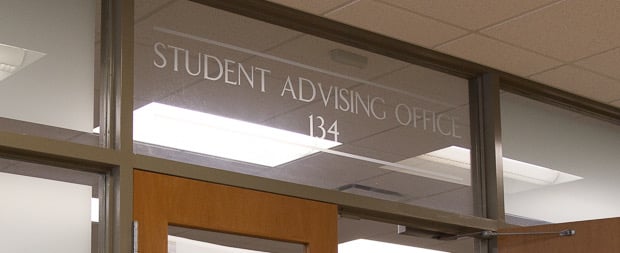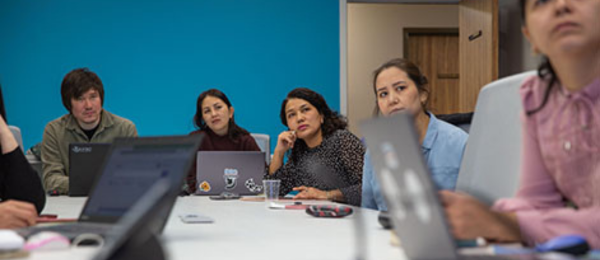
Gleaning Leadership Lessons from Gettysburg with Michigan EPFP Fellows
When readers last checked in on the Michigan Education Policy Fellowship Program (EPFP) via the September 2024 In Focus newsletter, the 33 Michigan education professionals making up the 2024-25 cohort were kicking off the 50th year of this program, facilitated by the Office of K-12 Outreach in partnership with the Institute for Educational Leadership (IEL). As such, the Fellows had just begun their personal and professional learning journeys focused on developing their education policy, leadership, and networking knowledge and skills. To support this learning, the Michigan EPFP Co-Coordinators had designed a September 9th orientation session that gave Fellows some structured and unstructured opportunities to get to know one another, an overview of the program design and curriculum, the chance to initially delve into the state education policy ecosystem with Dr. David Arsen, Professor Emeritus of Education Policy and K-12 Educational Administration at Michigan State University, and some insights and tools to effectively network throughout the Michigan EPFP experience. From there, the group immersed itself in the program’s leadership component at the second session on September 23rd. Aligned with this goal, the Fellows assessed their leadership style and personality preferences via the Myers-Briggs Type Indicator and Thomas-Kilmann Conflict Mode Instrument, and they explored some resources that policy entrepreneurs use to track legislation and effectuate societal change.
With this enhanced background in leadership and networking, the group was ready to take their learning on the road to Carlisle, Pennsylvania, for the 2024 Regional Leadership Forum on Thursday, October 10th, and Friday, October 11th. Awaiting conference attendees were two days of site visits, battlefield tours, seminars, facilitated discussions, and peer-to-peer learning with other Michigan EPFP Fellows and individuals from cohorts in Pennsylvania and New York. Centrally, this Forum was focused on helping Fellows recognize leadership lessons from the Battle of Gettysburg and current practices at the U.S. Army War College, connect these ideas to their professional context, and develop a plan to incorporate some of these resultant new insights into their lives. That said, this experience was also a chance for Michigan EPFP Fellows to strengthen their ties with each other, get to know similarly invested education leaders in other states, informally learn about education policy in different communities, better identify their driving purpose, develop some historical context for their work, and compare how varied educational entities prepare their students for the unique challenges they might face.
To start the Regional Leadership Forum’s first day, the Fellows met at the Gettysburg National Military Park Museum and Visitor Center. Just as the cohort had spent their first two EPFP sessions in Michigan developing some background conceptualizations of leadership to inform their experience in Pennsylvania, this element of the conference offered folks the chance to refresh their historical knowledge related to the U.S. Civil War and the Battle of Gettysburg to ensure they could dig into leadership lessons from the conflict and their staff ride. Specifically, the group explored the historical displays decorating the Gettysburg Museum, collectively viewed the film that welcomes all battlefield visitors, “A New Birth of Freedom,” and experienced the awe-inspiring Gettysburg Cyclorama, a four-story tall, 360-degree painting of Pickett’s Charge. Having (re)familiarized with the state of the nation in 1863 and the context surrounding this conflict, the group was ready to join a collection of certified Gettysburg guides for a bus tour of the battlefield. Over a few hours, the Fellows visited essential Gettysburg sites, including McPherson Ridge, Cemetery Hill, Seminary Ridge, Cemetery Ridge, Culp’s Hill, Devil’s Den, the Wheatfield, the Peach Orchard, and the Pennsylvania Memorial. At each location, the Fellows got a better sense of what was occurring on each day of the battle, unpacked what they could glean from each side’s leaders, and shared how they were internalizing leadership lessons. Excitingly, after years of being impacted by the COVID-19 pandemic and restoration efforts, for the first time since the 2019 Regional Leadership Forum, the group could visit Little Round Top – a site that some historians have labeled “the key to the developing battle” and a location with incredible views of the entire battlefield (American Battlefield Trust). Finally, after a long day of historical content, exploration, and discussion of leadership, the group retreated to the Cumberland County Historical Society in Carlisle to debrief the day, share some refreshments, and review their takeaways from the first day of the Regional Leadership Forum.
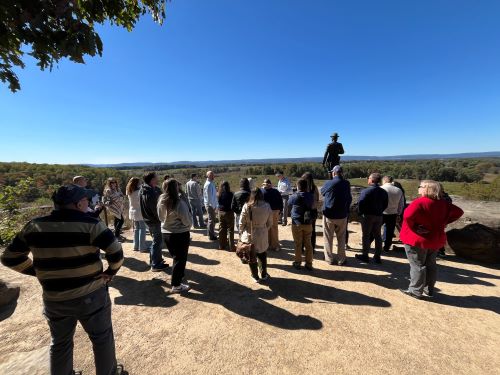

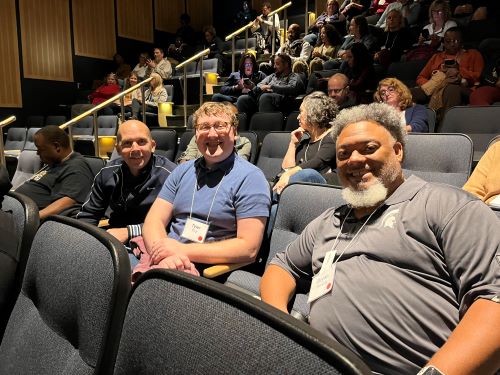
Snapshots from day one of the 2024 RLF
On the gathering’s second day, the Michigan, New York, and Pennsylvania Fellows transitioned to the U.S. Army War College to hear some expert perspectives on the leadership lessons from the Battle of Gettysburg, along with how this institution educates its students. First, Dr. David Dworak, U.S. Army War College Provost, welcomed the group, provided an overview of this institution’s approach to developing strategic leaders, and set the stage for other speakers to dig into actionable recommendations for program participants. Then, Dr. Daniel Krebs, Associate Professor of Security Studies at the U.S. Army War College, shared some of the leadership insights that he provides to his students when they visit and discuss Gettysburg and offered the Fellows some time to offer their own reflections, having had the chance to tour the battlefield, internalize and process their observations, and discuss the experience with their peers. From there, Colonel Heather Smigowski, Chair of the Department of Distance Education at the U.S. Army War College, dug deeper into how this institution develops its leaders based on everyone’s particular needs and how the College has taken advantage of lessons from the COVID-19 pandemic to offer rigorous distance learning experiences to enrollees. Next, Commander Mike Posey, Director of Maritime Operations for the U.S. Army War College, presented some frameworks for how this institution prepares individuals to manage wicked problems, which he identified as a key piece of strategic leadership. Finally, the group transitioned to the Letort View Community Center on the base to have lunch and hear from Dr. Edward Kaplan, Dean of the School of Strategic Landpower at the U.S. Army War College, on how this organization manages change and works through curricular reforms.
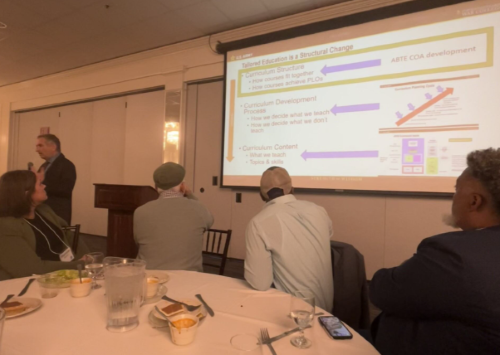
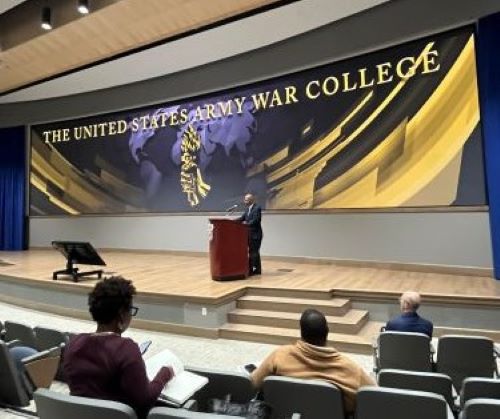

Scenes from the second day of the 2024 RLF
Through these diverse experiences at the 2024 Regional Leadership Forum, the Michigan EPFP Fellows were exposed to practical lessons related to the importance of leaders motivating their hierarchical subordinates and meeting these individuals’ human needs, incorporating technological innovations into their work, communicating clearly, succession planning, delegating important tasks to other leaders and developing these folks’ ability to oversee these missions, forecasting looming possibilities, adapting current approaches to likely futures, managing limited resources, dealing with rapidly changing environments, establishing expectations, and generating rapport with peers. From now until the conclusion of the 2024-25 Michigan EPFP program year in June, the Fellows will have the chance to revisit these takeaways. With that, they will get to apply them to their daily work and issues of interest as the cohort begins to attend more purposefully to the program’s policy strand at the next session on Monday, November 4th, and beyond. As the group continues their learning, their added growth will be featured in future editions of In Focus. Until then, readers eager to learn more about the Michigan EPFP experience can email Co-Coordinator Tyler Thur at thurtyle@msu.edu.
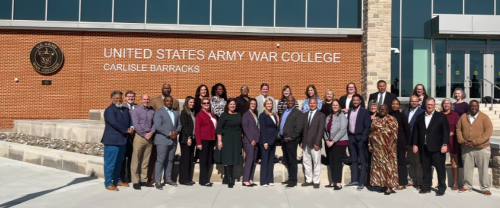
Michigan EPFP Fellows at the U.S. Army War College
